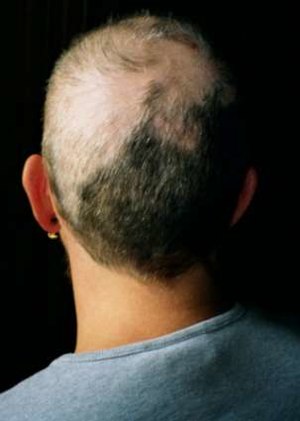Trichotillomania
| Trichotillomania | |
|---|---|
| Synonyms | trichotillosis, hair pulling disorder |
 |
|
| A pattern of incomplete hair loss on the scalp of a person with trichotillomania | |
| Pronunciation | /ˌtrɪkəˌtɪləˈmeɪniə/ TRIK-ə-TIL-ə-MAY-NEE-ə |
| Classification and external resources | |
| Specialty | Dermatology, psychiatry |
| ICD-10 | F63.3 |
| ICD-9-CM | 312.39 |
| OMIM | 613229 |
| DiseasesDB | 29681 |
| MedlinePlus | 001517 |
| eMedicine | derm/433 ped/2298 |
| MeSH | D014256 |
Trichotillomania (TTM), also known as hair pulling disorder, is an impulse control disorder characterised by a long term urge that results in the pulling out of one's hair. This occurs to such a degree that hair loss can be seen. Efforts to stop pulling hair typically fail. Hair removal may occur anywhere; however, the head and around the eyes are most common. The hair pulling is to such a degree that it results in distress.
The disorder may run in families. It occurs more commonly in those with obsessive compulsive disorder. Episodes of pulling may be triggered by anxiety. People usually acknowledge that they pull their hair. On examination broken hairs may be seen. Other conditions that may present similarly include body dysmorphic disorder, however in that condition people remove hair to try to improve what they see as a problem in how they look.
Treatment is typically with cognitive behavioral therapy. The medication clomipramine may also be helpful. It is estimated to affect one to four percent of people. Trichotillomania most commonly begins in childhood. Women are more commonly affected than men. The name was created by François Henri Hallopeau in 1889, from the Greek θρίξ/τριχ- thrix meaning "hair", τίλλειν tíllein meaning "to pull", and μανία mania meaning "madness".
Trichotillomania is defined as a self-induced and recurrent loss of hair. It includes the criterion of an increasing sense of tension before pulling the hair and gratification or relief when pulling the hair. However, some people with trichotillomania do not endorse the inclusion of "rising tension and subsequent pleasure, gratification, or relief" as part of the criteria; because many individuals with trichotillomania may not realize they are pulling their hair, patients presenting for diagnosis may deny the criteria for tension prior to hair pulling or a sense of gratification after hair is pulled.
...
Wikipedia
